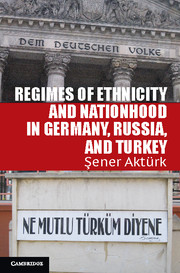Book contents
1 - Regimes of Ethnicity
Comparative Analysis of Germany, the Soviet Union, Post-Soviet Russia, and Turkey
Published online by Cambridge University Press: 18 December 2014
Summary
The Puzzle of Persistence and Change in State Policies toward Ethnicity
This book explains the dynamics of persistence and change in state policies toward ethnicity. How do state policies that regulate the relationship between ethnicity and nationality change?
When Mahmut Erdem, a Turkish citizen of Kurdish descent and Shiite-Davidic faith, who lived in Germany since the age of eight, was naturalized as a German citizen in 1989, he joined an exceptionally small category of people who acquired German citizenship without being ethnically German. As late as 1986, twenty-five years after Germany began recruiting workers from Turkey, only 7,986 Turks were naturalized as German citizens, although nearly two million Turks lived in Germany. The situation was not different for the remaining 4,512,679 immigrants who lived in Germany. Of Turks in Germany, 99.5 percent were not German citizens, because German citizenship law, since 1913, conceived of citizenship as the right, or privilege, of ethnic Germans, allowing for the naturalization of nonethnic Germans only under very restrictive conditions. From the 1970s to the 1990s, attempts to grant citizenship to resident aliens failed. However, a new citizenship law was passed in 1999, and already by 2004, an estimated 840,000 Turks had German citizenship. How did such a tremendous change occur?
- Type
- Chapter
- Information
- Publisher: Cambridge University PressPrint publication year: 2012



